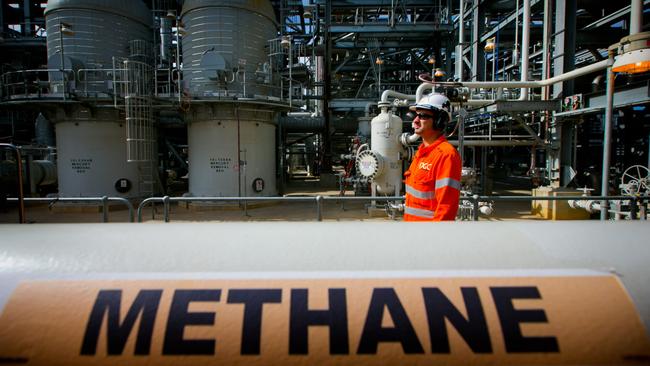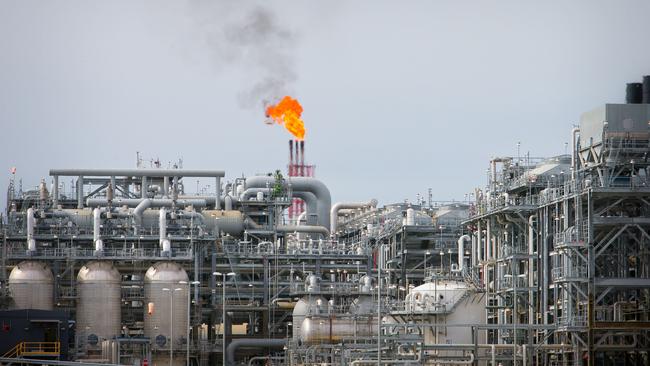Gas producers reject expanded powers for the Australian Energy Market Operator
Big gas producers are nervous about proposed intervention in the market just weeks after an LNG pact with the Albanese government was signed.

A plan for new gas powers to be handed to the Australian Energy Market Operator to avoid a supply crisis next winter has been rejected by big energy producers, who fear that a new interventionist regimen will increase risks just weeks after LNG exporters struck a supply deal with the federal government.
The proposal from energy ministers to allow the market operator to trade in gas and potentially intervene in the market has caused mounting panic among both users and big gas suppliers as Labor seeks to increase supply while lowering prices amid predictions of inflated tariffs for several years.
Large LNG producers and energy suppliers represented by industry body APPEA said increasing AEMO’s functions and powers to manage supply adequacy in the east coast gas market was unnecessary and harmed the industry.
“Little evidence is provided in the consultation paper of market failure in the east coast gas market that would justify the level of intervention proposed by this legislative package,” APPEA said.
“Consequently, government intervention through AEMO is likely to result in a sub-optimal outcome for energy users and participants. The Australian east coast gas market is mature and functional; the market will ensure there is enough gas.”
The gas industry is already on edge as Anthony Albanese moves to revamp the gas industry’s code of conduct to cut prices and unions say the government has not done enough to bring energy costs down for manufacturers.
The three big Queensland LNG producers agreed to a pact with Labor two weeks ago to provide an extra 157 petajoules for the domestic market next year, and charge domestic users no more than international customers, after the competition regulator warned of a shortfall in 2023.
APPEA – the Australian Petroleum Production and Exploration Association – pointed to a review of the existing gas supply guarantee, invoked for just the second time this winter, as a first step rather than creating new powers. “There is no discussion or information on the success of the current gas supply guarantee framework. APPEA considers that a formal evaluation of the GSG framework should be undertaken with government and market participants prior to establishing a new, potentially interventionist regime,” APPEA said in a submission.
“Additionally, more information is required as to what procedures and guidelines will be enforced.”
Documents prepared by energy ministers suggest an enhanced long-term role for AEMO, including “phase two reforms”. The intent of the policy is to allow AEMO to monitor the east coast system more effectively while heading off emerging risks through market interventions if the industry fails to respond.
The reforms follow emergency meetings of ministers during this winter’s energy crisis.
As gas and electricity prices surged, caps were introduced and the national electricity market was suspended.
The crisis put energy-intensive industries at risk, sent some retailers to the wall and added to a national inflation spike.
MST Marquee analyst Mark Samter said a lack of gas supply could have a damaging impact on electricity markets.
“Let’s be clear, given the outages we have in, say, Queensland at the moment, and the levels of rain threatening both the coal mines and access to the plants, if we follow up another period of heavy rain with a week of heatwave, the prospect of blackouts is very, very real this summer,” Mr Samter said. “If we have no functioning gas market that will just be an amuse bouche (appetiser) for the next few years.”
APPEA said it was also concerned over how the operator’s powers would extend to existing gas contracts in the sector.
“If the gas is contracted, does AEMO have the power to instruct that gas to be placed in the east coast market, and as such what does that mean for the contracts that have already been entered into?

“Additional consultation is required on the relationship between AEMO and contractual provisions.”
Energy Users Association chief executive Andrew Richards said that firms were being forced to pay between $30 and $35 a gigajoule for contracted gas, which was four to five times historic levels. State and federal governments are scrambling to put a new gas market framework in place to avert a repeat of the July crisis, when AEMO was forced to cap spot gas prices at $40 a gigajoule, and NSW retailer Weston Energy collapsed.
The aggressive timeline for consultation has been dictated by the need to put in place extra market protections ahead of next year’s expected winter surge in gas demand, exacerbated by the need to win agreement from the Victorian government before the state’s November 26 state election.
Under a quirk of AEMO’s operating rules, legislation giving effect to its mandate is made in the South Australian parliament – but the proposed new rules must win the approval of other state ministers before Victoria’s caretaker period begins on November 1, to remove the risk of delays that could mean they will not be in place ahead of the 2023 winter.
Analysis from the Australian Competition and Consumer Commission and AEMO has already forecast potential supply shortfalls next year, with the competition regulator saying in July that the east coast gas market could be facing a 56 petajoule shortfall in 2023 – about 10 per cent of forecast demand – unless more gas from Queensland liquefied natural gas producers is supplied into the domestic market.


To join the conversation, please log in. Don't have an account? Register
Join the conversation, you are commenting as Logout